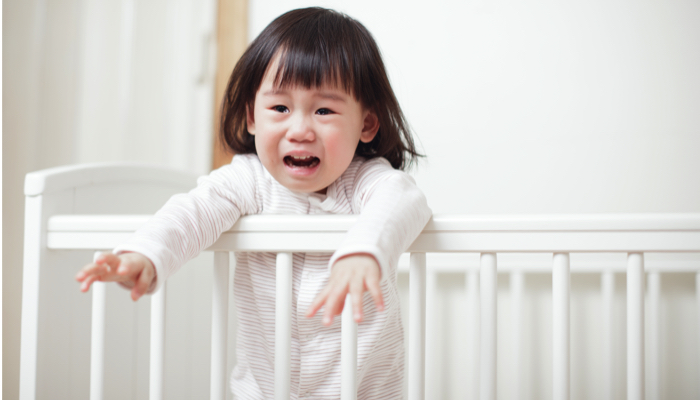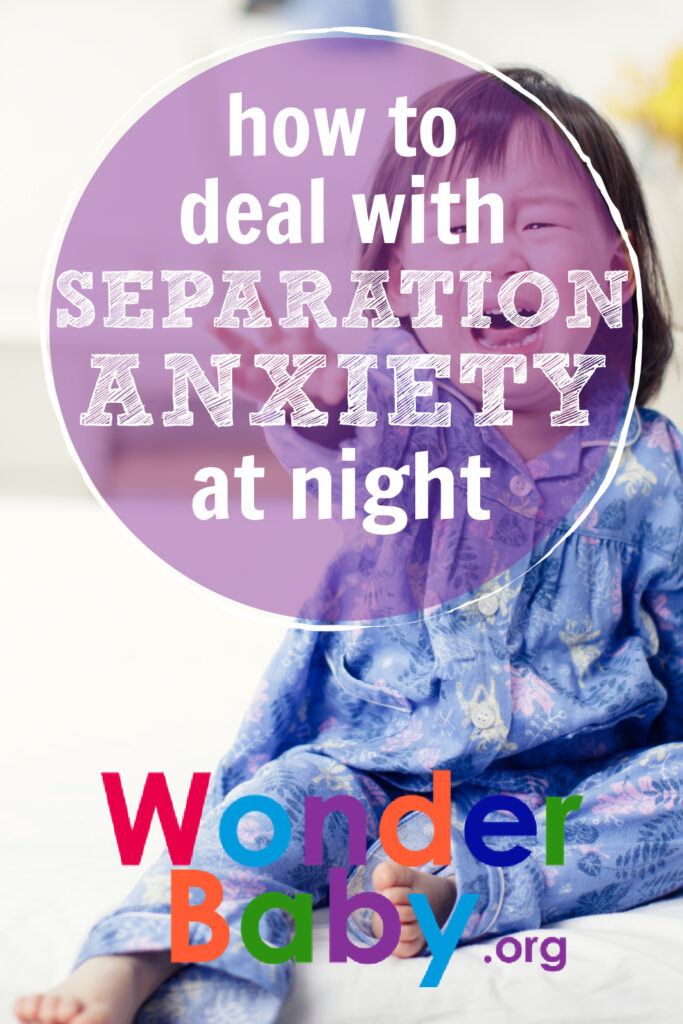How To Deal with Separation Anxiety in Toddlers at Night

- Separation anxiety is a normal part of your toddler’s mental development and is actually a great sign that they are growing as they should.
- Disruptions in your child’s sleep schedule can be exhausting and stressful, but it is important to remain calm to soothe your child and make their bedtime routine a pleasant experience.
- Keep a consistent, predictable schedule to minimize your child’s anxiety. When your child cries in the middle of the night, offer comfort but keep it minimal.
- Offering blankies, stuffed animals, a night light, or demonstrating breathing and visualization techniques are excellent ways to model coping skills for your toddler.
- Don’t give up. Most toddler separation anxiety only lasts for a period of 2-3 weeks.
Nighttime separation anxiety in toddlers is not only common, it’s actually a good thing! It is an indicator of an important developmental milestone. Although waking up multiple times in the middle of the night to console a crying baby is exhausting and often frustrating, rest assured that it is completely normal.
When babies are around 8 months old, they develop object permanence, which is the cognitive understanding that when something is out of their sight, it still exists. Because of this monumental development, your child becomes able to identify their special people–mommy, daddy, nana, papa, and other caregivers.
Suddenly, these caregivers become permanent objects in the child’s world and they are able to notice when those caregivers leave. This is when separation anxiety occurs in children.
Separation anxiety also stems from a deeply ingrained evolutionary instinct that our ancestors developed to protect themselves. In the hunter-gatherer days of ancient civilizations, if a child woke up and their caregivers were not around that meant abandonment or imminent danger.
Luckily, most of us don’t have to fear a mountain lion coming for our young, but we do need to teach proper coping skills, and provide a regular comforting bedtime routine to deal with these normal evolutionary responses.
Children experience anxiety at many stages of their childhood development and this is an opportunity for you to begin modeling different coping mechanisms for them to manage big feelings and worry.
What is Nighttime Separation Anxiety?
Separation anxiety in your toddler may look like:
- Refusing to sleep alone, or only sleeping when they know you are nearby
- Waking frequently at night and crying for you
- Crying and tantrums when you leave the room or go to work
- Clinging to you, especially in new situations or around others
- Fear of strangers
- Strong preference to you or a particular caregiver over others
- Longer, more frequent naps at inopportune times due to lack of proper sleep
What Causes Your Toddler’s Separation Anxiety?
There can be many contributing factors to your child’s separation anxiety, along with the fact that it is a normal part of the sleep regressions that happen at many stages of childhood. In this case it is most often around 8-12 months, 18 months, and 2 years old. Most children outgrow their nighttime separation anxiety by 3 years old.
There are many contributing factors that can increase your toddler’s separation anxiety, including:
- Starting at a daycare or preschool
- A new caregiver
- Arrival of a sibling
- Loss of a parent or caregiver
- Moving to a new home
- Feeling unwell from things like teething, a cold, or an ear infection
- Caregivers who are stressed, tired, frustrated, and emotional. Children will pick up emotional cues and emulate them.
How Does Separation Anxiety Affect Your Toddler’s Sleep?
While sleep regressions and separation anxiety can be a minor inconvenience or cause a few sleepless nights, they can grow into a much bigger problem if not handled properly. It’s imperative to establish a regular bedtime routine, beginning a few hours before they go to sleep, and avoiding giving in to certain behaviors like sneaking out of their bedroom or staying with them all night.
When they wake up in the middle of the night, keeping your comforting efforts to a minimum helps to avoid an overtired baby who may struggle to stay awake during the daytime, further disrupting their sleep schedule.

How to Handle Separation Anxiety in Toddlers at Night
There are many ways to handle your child’s separation anxiety in a way that helps build their coping skills, emotional management, and sense of independence.
- Maintain a regular, positive, bedtime routine. Avoid making your son or daughter’s room a punishment spot. Also, make sure that you and other caregivers play with them in their bedrooms regularly so that it is also a safe and fun place. For a toddler suffering with separation anxiety, the mere mention of bedtime or entering their room could trigger a meltdown.
- �
- Set a timer for at least 15 minutes and play calmly with them in their room before they realize that bedtime is approaching. When the timer goes off, clean up, read a short story while you rock in a chair or snuggle together and then put them down to sleep. Lovingly and firmly say goodnight and make your exit. For more help on sleep training methods, look into the Ferber method or chair sleep training methods.
- Watch your stress levels. Lack of sleep and dealing with bedtime tantrums can stretch a parent to their breaking point. We have all been guilty of crying right along with our babies when we just could not get them to sleep. Children pick up on our emotional and behavioral cues very well and become stressed and excited or agitated. An overstimulated baby is not a recipe for a restful night’s sleep.
- If you feel overwhelmed, frustrated, or emotional, try to remove yourself from the situation to take a few deep breaths and calm down. When you are able to approach bedtime like it is no big deal, so can your child.
- Don’t sneak away. Sneaking out of the room after your child falls asleep may work for you a few times and is extremely tempting, but in the long run this causes a much bigger issue. Sneaking away incites distrust and heightens your toddler’s fear that you will disappear without warning.
- Establishing that your child is safe, reassuring them that you’re still home and around even though you don’t sleep next to them, helps them to understand that this is a normal part of the day. Lovingly but firmly say goodnight and let them see you leave.
- Comfort your child if they need it, but don’t drag it out. If your child wakes up screaming in the middle of the night, by all means, go and comfort them. Rub their back, give quiet words of reassurance or humming until they calm down. But don’t make this a rewarded behavior either–no books, play, singing, or other wakeful activities.
- Try to refrain from removing them from the crib if you can. Offer comforting pats on the back until it is appropriate to exit. If you have to take a few minutes to rock them in a chair and soothe your toddler, keep it as brief as possible.
- Practice being separated even when you are together. Giving your child a chance to play independently develops their sense of autonomy. You can practice this also by giving them time with grandparents and other trusted family and friends so that your toddler knows that this is normal, and they will be just fine, even if mommy or daddy has to leave for a while. Establishing your child’s independence during the day, when their fears are naturally lower, helps them to cope with their anxiety in the evening.
- Acknowledge their feelings and emotions and teach them that it’s ok to feel exactly how they feel. Coping with big feelings and managing emotions is an essential tool to equip your child with, and this is a primary opportunity to put this into practice. Do not tell them to stop crying or that there is nothing to be sad about. Try putting yourself in their shoes and empathize with them, without coddling or prolonging this bedtime procedure.
- Soothe them with a snuggly blanket or lovey. Give them a snuggly blanket or lovey toy, and tell them that when they hug and kiss it that you feel it too. Often a child’s fears are heightened by the dark. A lovey that lights up, such as a glow worm, helps tremendously with this.
- Make sure that the toy is appropriate for night and not too bright or distracting. My daughter loved her vibrating, lullaby-singing lovey toy so much and it always helped soothe her to sleep. Having lovey toys to snuggle gives them a sense of your love and care being with them even when you are in another room.
- Teach coping and calming techniques. Outside of snuggling stuffed animals and soothing music or nightlight, children need to develop coping techniques. This is something you can begin even with toddler-aged children.
- Modeling how to take big, deep belly breaths to calm their nerves is a wonderful way to teach them how to relax during stressful times. Guide your child through visualizations to distract them from feelings of anxiety or trying to find ways to convince you to stay with them.
- I have used this technique on my daughter since the age of 2 and she still asks me to do it daily. Practice thinking of something that makes them happy before bed. It can be their favorite part of the day, what you are looking forward to tomorrow, or something completely fantastical – like a rainbow unicorn riding a spaceship to the moon, made of chocolate ice cream. You know what will make them giggle.
- This helps turn bedtime from a scary time to a one that is marked with memories of snuggles, silly conversations, and peacefully drifting off to sleep. It also helps to remind them of another time that they felt scared or nervous, but things worked out just fine.
- Don’t give up. We all make mistakes. Maybe you gave in and brought your toddler to bed with you or slept in their bedroom. It happens; we’re human. But it is important to get back on schedule and do so by explaining to your child that it was a one-time thing, and you will be going back to your normal sleeping arrangements.
- While it may seem obvious to you, it is not to a toddler. When they wake up and you are not there, it can be very scary. Toddlers need to know what to expect. Explain to them that even if they fall asleep while you are still in their room, when they wake up you will be in your “grown up bed.” Explaining this will assure them that you are still around, they are safe and protected, even if you are not right there.
Separation Anxiety at Night is a Battle that Can Be Won
Sleep regressions happen around the ages of 1 year, 18 months, and 2 years old and tend to coincide with when separation anxiety appears. It is a normal part of a child’s mental maturation and is actually a good sign that they have developed object permanence. Big life changes – like a change in daycare, a different caregiver, a new sibling, or teething can add to your child’s fear of bedtime and make it difficult for them to fall asleep.
The temporary loss of sleep is harmless as long as you follow a consistent bedtime routine that is aimed at keeping their sleep patterns regular and independent from you. Keep your emotions in check and don’t let your stress or exhaustion add fuel to their anxiety.
Don’t sneak away after your child falls asleep, and make sure you explain to your toddler where you will be, and that they are safe and protected. Acknowledge their feelings and allow them to express strong emotions. Teaching them coping skills to manage their emotions, like deep breathing, visualization, and distraction techniques help them to process their anxiety. And lastly, do not give up. Your child’s anxiety will not last forever if handled correctly.
FAQs
How long does nighttime separation anxiety last?
Typically, separation anxiety in toddlers lasts no more than 2-3 weeks. Children generally grow out of the nighttime separation anxiety phase completely by age three. If you’re worried that your child’s anxiety is not getting better after a few weeks, consult with your pediatrician.
When does nighttime separation anxiety peak in toddlers?
While toddlers may experience separation anxiety at various phases of their childhood, especially during their first developmental years, it usually peaks for toddlers between the ages of 10-18 months.

Related Posts

Sleep, Special Needs
Safe Place Bedding Travel Bed Review
Traveling with a special needs child can be stressful! Having a safe, durable, and easy to use travel bed can make traveling so much easier!

Behavior
Understanding Intermittent Explosive Disorder in Children
Are you worried about your child’s unexpected aggression and explosive behaviors? Learn how to support a child with intermittent explosive disorder.

Behavior
5 Emotional Regulation Activities for Kids
Want to teach your child how to regulate emotions? Here are emotional regulation activities for kids that can help!